|

Rocking Chair
Bear Lake, Idaho
2005
Still Lifes
Brandon Allen Photography
Black and White Photographs
"Account history no empty chair. ..."
— Patricia Coelho
Itaca Rodeada Pelas Ondas
_______________________
Father Time: Chronos and Kronos
Waggish
It is easy to confuse the Greek god of time, Chronos ..., with Zeus’s Titan father, Kronos ... . So easy, in fact, that the conflation has been made for over two thousand years. The Greeks conflated them regularly, at least according to Plutarch. The Romans then coopted Kronos into the form of Saturn, who later became known as Father Time and the god of time.
To make things even more confusing, sometime in the late Roman Empire, Saturn was then conflated with the Greek concept of kairos ..., which designates a pregnant or opportune “special” time. Kairos is somewhat opposed to chronos, which signifies day-to-day time in general. Chronos is the quotidian, the recurrent, the passing of the years, while kairos is the moment, the event, the suspension of the normal. But both were piled onto Saturn over the centuries.
Time is always a messy concept, in mythology and otherwise. I haven’t found a good overview of the nooks and crannies of these nominal twins; this is my attempt....(more)
_______________________
Theatres of the Catastrophal: A Conversation with Nathanaėl
Genevičve Robichaud
Lemon Hound
(....)
Translation’s disintegrative states have become something of a preoccupation; what I mean – and I’m still thinking this through – is that the instabilities instigated by translational acts are written into the text. Photographic processes have proven very instructive in relation to this. For example, Antonioni writes of the endless inscription onto photographic film of visual, material information that escapes the eye’s scrutiny. Prolonged development processes will reveal the ostensibly endless latent images contained in a single frame of film. In theory, one could expose an image ad infinitum, culling from the celluloid more and more infinite detail. But we know from a photographer such a Josef Koudelka, who practices a very sensitive relationship to time, that excessive development will produce a pitch black photograph – one could imagine this as the absolute, the most complete photograph, in which the intricate detail produces a solid, impenetrable mesh of opacity. In which everything is inscribed and nothing is legible. A corollary exists in translation, and it is the moment at which the texts – foregoing the bilateral language of source and target texts (with its tidy between, and problematic direction) – the texts, with their languages, enter into disintegrative states. It has something to do with proximities and loss of intelligibility. It has something also to do with vigilation. The moment at which one is most focused might be the moment one must close one’s eyes out of sheer intensity. Something is, of necessity, eradicated, in one’s apprehension of — disaster, say. Absolute vigil does not, can not, exist. The senses cannot abide such demand....(more)
_______________________

Ruin of Taby (Shell) Construction
St. Mary's Georgia, 1936
Walker Evans
Everyday America:
Photographs from the Berman Collection
Steven Kasher gallery
via
_______________________
Ruin and Renewal
Alison Hawthorne Deming
(....)
This is the template engrained in the human imagination: cycles of ruin and renewal measure the way the world works. Spring follows winter, new growth rises from forest decay, raspberries follow ruin, peace ultimately follows war, recovery follows the storm. Climate change is frightening on a deep level, because it can seem as if renewal is impossible. It's easy to feel like we're watching a demolition derby, becoming obsessed with counting up what crashes. Psychic numbing sets in and it's time to go shopping again. I'm grateful I've had the privilege to observe this patch of forest, this view of the sea, for over 50 years. I'm wired to write about this place, neurologically linked to it after so many years of watching it display simultaneously all stages of living and dying. How does this translate to urban life? To youth displaced by economic and ecological misfortune? To find the precise words to speak one's truth is to defy ruin and make the energy of renewal rise. Here's to defiance and here's to the rising.
...(more)
Terrain.org: A Journal of the Built + Natural Environments _______________________

Cornish Harbour
1951
William Scott
b. Feb. 15, 1913
_______________________
Lars Iyer Interviewed
Totally Dublin
... remembering what was once possible is itself a form of hope, and a writing which mourns is still a kind of writing.
_______________________
Listening for the Jabberwock
Tim Parks
Translated texts, then, and there are ever more of them in the world today, tend to be cooler, a little less fluid-they will operate more on the rational intellect than on the rhythm-wired senses. They will deceive you less and charm you less. Of course there are notable exceptions, texts which were translated with the seduction of the reader and the beauty of the language very much in mind. Where these are old and central to our culture-the Bible, most remarkably-they can become canonical on a par with our home-grown writing. But there really are remarkably few of them.
...(more)
_______________________
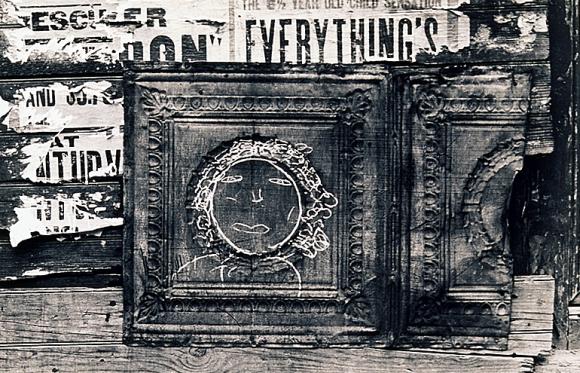
New York
(Graffiti, Circular Face)
Helen Levitt
1937
_______________________
Basic Banalities
Raoul Vaneigem
(....)
The concept of a common fate is based on the sacrifice of the owner and the nonowner. Put another way, the notion of a human condition is based on an ideal and tormented image whose function is to resolve the irresolvable opposition between the mythical sacrifice of the minority and the really sacrificed life of everyone else. The function of myth is to unify and eternalize, in a succession of static moments, the dialectic of "will-to-live" and its opposite. This universally dominant factitious unity attains its most tangible and concrete representation in communication, particularly in language. Ambiguity is most manifest at this level, it leads to an absence of real communication, it puts the analyst at the mercy of ridiculous phantoms, at the mercy of words -- eternal and changing instants -- whose content varies according to who pronounces them, as does the notion of sacrifice. When language is put to the test, it can no longer dissimulate the misrepresentation and thus it provokes the crisis of participation. In the language of an era one can follow the traces of total revolution, unfulfilled but always imminent. They are the exalting and terrifying signs of the upheavals they foreshadow, but who takes them seriously? The discredit striking language is as deeply rooted and instinctive as the suspicion with which myths are viewed by people who at the same time remain firmly attached to them. How can key words be defined by other words? How can phrases be used to point out the signs that refute the phraseological organization of appearance? The best texts still await their justification. When a poem by Mallarmé becomes the sole explanation for an act of revolt, then poetry and revolution will have overcome their ambiguity. To await and prepare for this moment is to manipulate information not as the last shock wave whose significance escapes everyone, but as the first repercussion of an act still to come.
...(more)
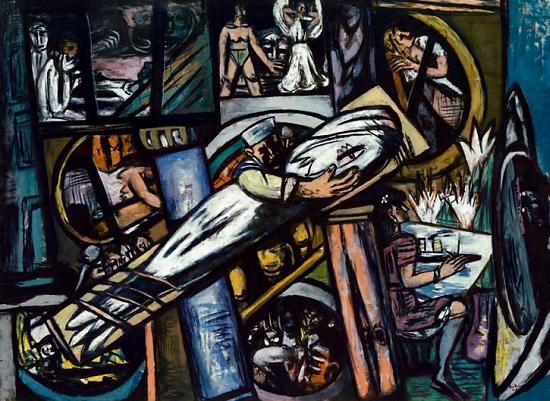
Cabins
(1948)
Max Beckmann
b. Feb. 12, 1884
_______________________
Now Winter Nights Enlarge
Thomas Campion
b. Feb. 12, 1567
Now winter nights enlarge
The number of their hours;
And clouds their storms discharge
Upon the airy towers.
Let now the chimneys blaze
And cups o’erflow with wine,
Let well-turned words amaze
With harmony divine.
Now yellow waxen lights
Shall wait on honey love
While youthful revels, masques, and courtly sights
Sleep’s leaden spells remove.
This time doth well dispense
With lovers’ long discourse;
Much speech hath some defense,
Though beauty no remorse.
All do not all things well;
Some measures comely tread,
Some knotted riddles tell,
Some poems smoothly read.
The summer hath his joys,
And winter his delights;
Though love and all his pleasures are but toys,
They shorten tedious nights.
_______________________

The Yellow River
Zhan Kechun
via Joerg Colberg
_______________________
Culture & History Digital Journal
Vol 1, No 1 (2012)
History, Archives and the Internet
Jean-Claude Robert
Abstract
The relationship between historians and archives is generally taken for granted. But this impression is misleading. Across the world, the building of archival collections involves a complicated process of selection and destruction. Traditionally, historians do not really know how this process is being conducted and very often a good proportion of them believe that all documents should be kept. The evolution of history and the questioning of the archives by philosophers cannot be ignored and these have changed the relationship between historians and archives. However, the construction of tomorrow's archives is happening right now, and historians should be prepared to find a way to participate in this operation. The role of archivists is central in the whole process. In the past, archivists generally received a basic training as historians, but since the 1950s, they have been more and more involved with other disciplines like library or information sciences. They became professionals in a new discipline. Historians should take notice of this reality and be prepared to work with archivists on an equal footing. They must learn what archivists are doing and join them to help create archival collections for the future. The last part of the paper takes a quick looks at the evolution of the Internet as an addition, or rather than as an extension, of archival holdings. _______________________
from “147 Million Orphans: A Haybun”
Eileen R. Tabios
MMXXV.
coral
dyslexias cycle
befallen delirious ludicrous
Time is ever a cycle. Whilst a piece of coral equals mere snapshot. Time is
always a cycle as if no dyslexias exist. And perhaps no dyslexias exist if nature
is nature and who is anybody to second-guess? What’s a two-headed cat when
identity is ever in flux? Well, the poet second-guesses because a poet can fall
into this avocation that breeds the delirious as well as the ludicrous—some call
them “angels.”
We accept what we do not know, even label them “angelic.” Delirious.
Ludicrous. We have plummeted so low we cannot fathom that this, too, is simply
cyclical. We have stopped breathing in our speed towards what sages
consistently counsel to avoid in unending iterations of encyclopedias. We shall
be stopped by that seductive reef known by natives as The Grand Anonymous—
a luminous body, but for what? When one pink shard shall pierce a vital organ,
shall our last thought be on its magnetic beauty? Did we know enough to
anticipate the serrated, sharp edges of desire?
The Marsh Hawk Review
(Winter 2013)
Edited by Thomas Fink
Eileen R. Tabios edits Galatea Resurrects and blogs at The Blind Chatelaine's Keys
_______________________
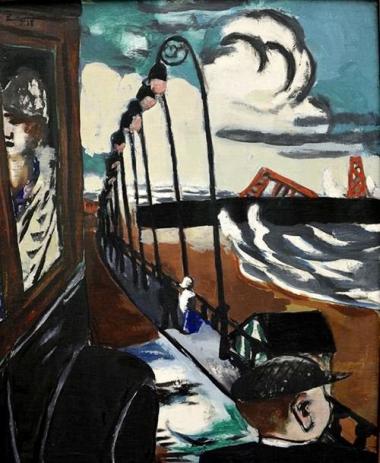
Max Beckmann
_______________________
childhood & philosophy
Vol 8, No 16 (2012)
Rethinking Temporality in Education Drawing upon the Philosophies of Merleau-Ponty and Deleuze: A Chiasmic Be(com)ing
Susanne Westman, Eva Alerby
Abstract
The children of today live in a time when the images of themselves and their childhood, their needs, interests, and skills, are discussed, researched, challenged, and changed. Childhood, education and educational settings for young children are to a great extent governed by temporality. In this paper, temporality and temporal notions in education are explored and discussed. We especially illuminate two different ways of thinking about children in education and care for younger children in the West— the predominant biased notions of the child as becoming or being. The child as becoming, is manifested primarily in classical developmental psychology while the notion of the child as being, has been highlighted mainly by sociological researchers in their critique of developmental psychology. This latter notion is also visible in a totally different manner in the philosophy of Rousseau, emphasizing the free and natural child. In addition, we explore an alternative way of thinking about temporality and children. Drawing upon the philosophy of Maurice Merleau-Ponty and Gilles Deleuze, we argue for a rethinking of temporality beyond linear views on time and biased notions of children as ‘either or’. A movement towards a perspective which not only combines notions, but where the whole is more than merely the sum of the parts, is proposed. This leads to an ambiguous, intertwined and ongoing connection between the temporal notions of have been, being and becoming, described by a novel concept—a chiasmic be(com)ing. We suggest that this alternative may be a fruitful way to overcome binary approaches and expand the discussion of temporality, and temporal notions of children, in education. Such an alternative could function as a counterweight to the predominant notions of education and teachers’ work. It may also be seen as a significant foundation for an ethical education since it is built upon ongoing and intertwined relationships, which appreciate openness and unpredictability.
_______________________
Freire in Theory and Practice: [pdf]
An Essay Review of Paulo Freire: The Man from Recife
Rebecca Tarlau
via Stephen Downes
_______________________
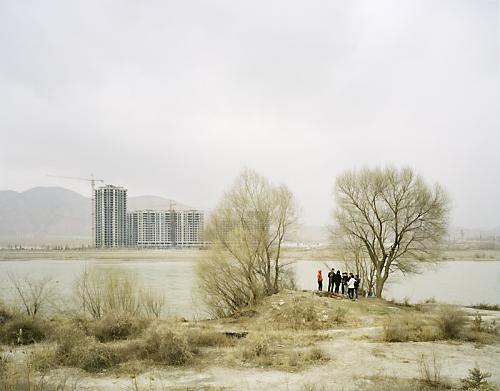
Zhan Kechun
_______________________
Everything We Know So Far About Drone Strikes
Cora Currier
ProPublica
The Excellent Age of No-Fuss Drones and Remarkable War
Ta-Nehisi Coates
atlantic
(....)
... its one thing to say, "We understand that there will be innocent children who will die because of this kind of warfare, but we must employ all available means to secure American lives and interests." And all another to say as Brennan speaking for the Obama administration did, "there hasn't been a single collateral death because of the exceptional proficiency, precision of the capabilities we've been able to develop." In fact, there have been many "collateral deaths," but they are of the sort that most Americans will never see and,most of us suspect, don't much care about.
But if that's really true, then there is no need to dissemble. There's no need for words like "imminent" when you really mean "when I feel like it" or claiming that you're acting with a country's permission when you're pledged to acting regardless. Americans need not feel ashamed for doing what states always do--act in their best interests. I think it's highly debatable whether drones are in our best interests. In fact I suspect we're seeding future wars.
But our real problem is that we somehow think we're above our own interests, that our virtue is divine. Our problem is we think we're better than we actually are. We've gotten so good at telling ourselves this....(more)
_______________________
The Life and Afterlife of Aaron Swartz
via Tom Matrullo
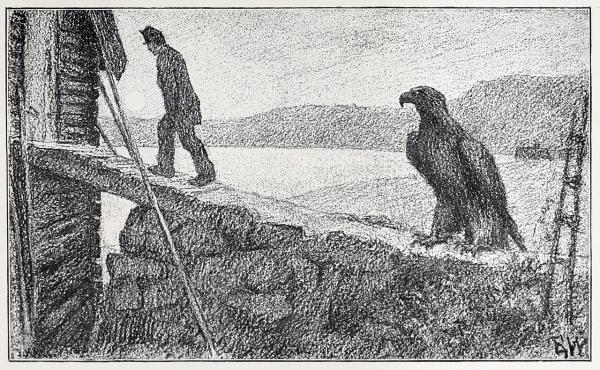
Erik Werenskiold
b. Feb. 11, 1855
from Fairy tales from the far North
by Peter Christen Asbjųrnsen, London, 1897
OBI Scrapbook Blog
_______________________
Exodus
Lars Iyer
bombsite
(....)
I came from the outside, and I brought the outside with me, W. says. I came from the everyday and had to stamp the everyday from my boots.—‘How long had you been unemployed?’ Years, I tell him. Years!: W. can’t imagine it.—‘And for how long before that had you worked in your warehouse?’ Years again.—‘Years!’, W. exclaims. Of course, there was also my time with the monks. Ah yes, my ever-surprising monk years, W. says.
But there you were, and who had seen anything like it?—‘You were like a one man horde, a Tartar’. There was spittle on my lips and drool in my beard. Had I ever heard of a footnote? Did I know what an appendix was, or what op. cit. might mean? Scholarly standards were an irrelevance to me; academic conventions an imposition I could completely ignore. It was quite impressive.
‘Your book! Your first book!’ W.’s still amazed. It was entirely without scholarship, without ideas, W. says. Without the usual concern to explain or to clarify. A book almost entirely lacking in merit. And yet! W. saw something there, although no one else did. He saw it, and not in spite of its many typos and printing errors . . . It was there because of them, W. says. It was inextricable from them: a kind of massive, looming incompetence. A cloud of stupidity covering the sun, and belonging to it like its shadow.
It was demonic, W. says. It was as forceful as a demi-urge. That’s when he became aware of it as a kind of unGod, as a division of darkness within light, of death within life. How could anything so bad have been written? Who could have defiled the temple of scholarship and revealed it to have been always defiled? He saw it, W. says, even if no one else did. And it was his role to look after me, until the very end.
...(more)
Exodus is available from Melville House
_______________________
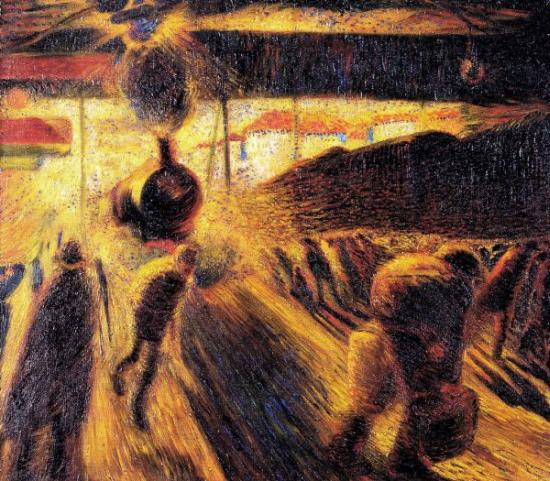
Stazione di Milano
1909
Carlo Carrą
b. Feb. 11, 1881
_______________________
On the smart city;
Or, a 'manifesto' for smart citizens instead
Dan Hill
cityofsound
(....)
... this might appear at first glance like a destructive critique of technology in the city. It is not. Technology is culture; it is not something separate; it is no longer “I.T.”; we cannot choose to have it or not. It just is, like air. There are different forms of technology in different cities, of course, but given that technology and culture have fused (arguably, always had) the issue is now a cultural one; what kind of culture do we want in our cities? How do we orient ourselves, with regards to today’s particular technological cultures?
We know how our cities were oriented as regards irrigation, language, currency, double-entry book-keeping, clocks, looms, trains, sewage, power plants, elevators, cars, containers—these are all forms of technology, which were in some way aligned to, and sprang from, the core urban dynamics of their age (and perhaps those eternal urban drivers of culture and commerce.)
So, how do we orient our cities as regards The Network? And how might this then address the core issues of our age?...(more)
_______________________
Transversal journal 01/13:
The Languages of the Banlieues
“The crises within cognitive capitalism and cognitive labor are mirrored in the reproduction and exacerbation of global divisions of labor and the emergence of new forms of exploitation as part of a regime of flexible capital accumulation. While drastic austerity measures and heightened control mechanisms lead to a radical transformation of the welfare state on the one hand, new networks of communication, struggle and alternative forms of knowledge emerge on the other.
This issue of transversal attempts to review some of the general assumptions of a theory of cognitive capitalism and to unsettle the very notions of knowledge and its production, discussing the conditions of its capture, its “re-invention” and its capacity for creating worlds. The individual essays follow the lines of a (post-)colonial historicity and a feminist and geopolitical critique of capitalist valorization, thereby questioning the materiality of knowledge and its production in relation to resources and bodies, as well as how art and knowledge production are interwoven with political struggles.” (Editorial)
.....................................................
Banlieue
Wikipedia
_______________________
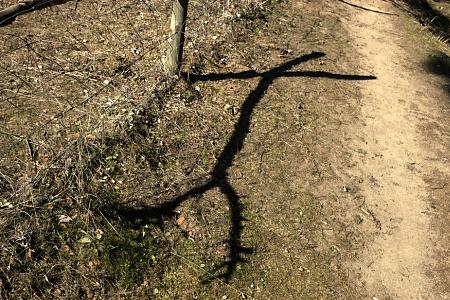
Antonio Xoubanova
An Hour of Magic Strangeness in the Park:
Antonio Xoubanova’s Casa de Campo
The Great Leap Sideways
Stanley Wolukau-Wanambwa, Editor
_______________________
"A Further Witness," for Anselm Hollo
Jerome Rothenberg
1/
I who
am dead
call to
the living
little
brothers
how absurd
your walk
is
unencumbered
& adrift
you run across
life’s
stage
your words
are manacles
& cage
your mind
I know
enough of you
to sense
your pain
freely
& fiercely
I move
into a deeper
space
where none
will reach me
here
I strike
a blow
an imbeciling
fluid
from inside
my body (A. Artaud)
covers
the ground
between
& blocks
all entry
birds
like little
knives
dive
down the sky
le mal
du ciel
the phrase
I hear
& fly from
...(more)
_______________________
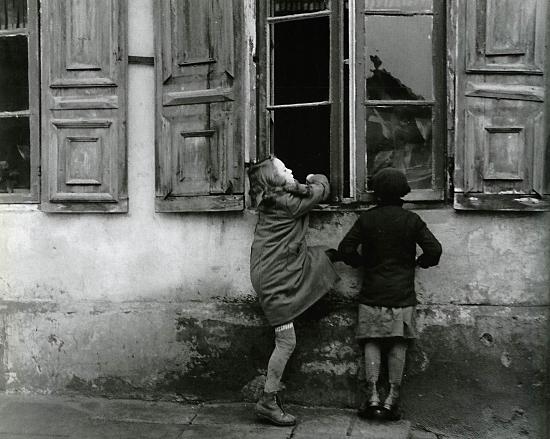
Roman Vishniac's eyes
Poemas del rķo Wang
_______________________
nostalgia for press cuttings
Richard Nelsson
Mention the words "press cuttings" to journalists of a certain age and they will usually come over all misty-eyed about the yellowing newspaper files of their youth.
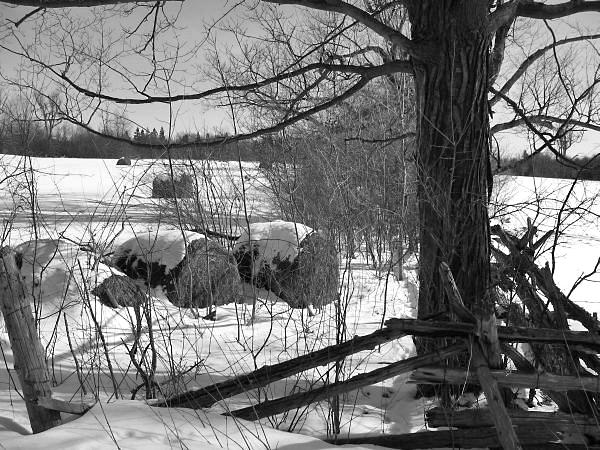
photo - mw
_______________________
The Windows
Paul Hoover
conjunctions
Praying for the Archbishop
I.
This is my entreaty and my first word. The old
lacking in any charm, cars in the carport,
—such feverish violins—beyond established archives,
a silken paradise, overstuffed panorama.
Guns, knives, and fists prepare a brief eternity,
however it’s sliced, diced, or remembered.
Begotten by a world of forms, one regrets
the lasting effects of a brief memorandum.
II.
A refined woman may sing the filthiest songs,
her ragged lips, ripped young men, despite
the Puritans who wear silk stockings to bed, who lately sleep
within the dream of every well-tucked sheet,
for never is there cleanliness
without its rampant shadow,
and thereupon I pitch my tent and bravely sing
in the parking lot of a burning church.
...(more)
_______________________
 To Sit in the Water
"Expert Swimmers can do whatever they please in the water; they can walk there, stand still upright, or lye still or sit down. To sit, you must take both your Legs in your Hands, draw in your Breath, and so keep your Breast inflated; your Head upright, and lifting up successively your Arms and Legs by that motion sustain your self."
The Art of Swimming
Wherein naked early modernists
get wet in the name of science!
bibliodyssey
'The Art of Swimming. Illustrated by proper figures. With advice for bathing. By Monsģeur Thevenot. Done out of French. To which is prefixed a prefatory discourse concerning artificial swimming, or keeping ones self above water by several small portable engines, in cases of danger'
_______________________
False Memories of Fabricated Political Events
Steven J. Frenda, Eric D. Knowles, William Saletan, and Elizabeth F. Loftus
Journal of Experimental Social Psychology, Vol. 49, 2013
Abstract:
In the largest false memory study to date, 5,269 participants were asked about their memories for three true and one of five fabricated political events. Each fabricated event was accompanied by a photographic image purportedly depicting that event. Approximately half the participants falsely remembered that the false event happened, with 27% remembering that they saw the events happen on the news. Political orientation appeared to influence the formation of false memories, with conservatives more likely to falsely remember seeing Barack Obama shaking hands with the president of Iran, and liberals more likely to remember George W. Bush vacationing with a baseball celebrity during the Hurricane Katrina disaster. A follow-up study supported the explanation that events are more easily implanted in memory when they are congruent with a person's preexisting attitudes and evaluations, in part because attitude-congruent false events promote feelings of recognition and familiarity, which in turn interfere with source attributions.
Social Science Research Network (SSRN)
_______________________
Empire of Panic and Ephemera
Applying Rigorous Imagination to America's Paranoid Style
Phil Rockstroh
Handsomely equipped to fail, I went out into the world.
-
John Fowles, from The Magus
In the consumer paradigm, one is induced to exist by Eric Hoffer’s dictum: “You can never get enough of what you really don’t need.” Wherein: The individual exists in a state of perpetual adolescence, emotionally oscillating between life lived as a bliss ninny and evincing chronic dissatisfaction.
Ever shifting, inchoate compulsions and endless distractions define the days of the denizens of the consumer state. Text messages and tweets gibber like souls stranded in a limbo realm between the worlds of the living and the damned.
Craving and angst are interwoven. Held by the dazzle of light playing over the surface of a deep abyss, the consumer floats along on waxen wings of debt. The landscape does not seem solid.
Constant craving and callous disregard ascend to the throne room of consciousness in this empire of ephemera. The passions of the heart are circumvented by chronic discontent. In this manic mythos of the eternal moment, consumer items are collected, clutched, and discarded, like the idols and talismans of a dying cult. But there is neither the time nor inclination to erect statues to these gods of the limbic system; the gods exist as ever-reconfiguring constellations of pixels…. As noxious as nixies, they hold the senses enthralled as the global, capitalist paradigm sinks beneath a drowning tide of self-created illusion.
Beneath the endless obligation of debt servitude and the manic distractions of the consumer state, an amorphous dread gathers. Shunted aside, it is experienced as free floating, low grade paranoia....(more)
_______________________

photo - mw
_______________________
The Scary Truth About How Much Climate Change is Costing You
Coral Davenport
12 Responses to National Journal Warns The Economic Price Of Climate Change Is Already Here, And Growing
Jeff Spross
thinkprogress.org

Haystacks in the Snow
Franz Marc
b. Feb. 8, 1880(February 8, 1880
_______________________
IX
The last leaf that is going to fall has fallen.
The robins are lą-bas, the squirrels, in tree — caves,
Huddle together in the knowledge of squirrels.
The wind has blown the silence of summer away.
It buzzes beyond the horizon or in the ground:
In mud under ponds, where the sky used to be reflected.
The barrenness that appears is an exposing.
It is not part of what is absent, a halt
For farewells, a sad hanging on for remembrances.
It is a coming on and a coming forth.
The pines that were fans and fragrances emerge,
Staked solidly in a gusty grappling with rocks.
The glass of the air becomes an element –
It was something imagined that has been washed away.
A clearness has returned. It stands restored.
It is not an empty clearness, a bottomless sight.
It is a visibility of thought,
In which hundreds of eyes, in one mind, see at once.
(....)
XI
In the land of the lemon trees, yellow and yellow were
Yellow-blue, yellow-green, pungent with citron-sap,
Dangling and spangling, the mic-mac of mocking birds.
In the land of the elm trees, wandering mariners
Looked on big women, whose ruddy-ripe images
Wreathed round and round the round wreath of autumn.
They rolled their r’s, there, in the land of the citrons.
In the land of big mariners, the words they spoke
Were mere brown clods, mere catching weeds of talk.
When the mariners came to the land of the lemon trees,
At last, in that blond atmosphere, bronzed hard,
They said, “We are back once more in the land of the elm trees,
But folded over, turned round.” It was the same,
Except for the adjectives, an alteration
Of words that was a change of nature, more
Than the difference that clouds make over a town.
The countrymen were changed and each constant thing.
Their dark-colored words had redescribed the citrons. An Ordinary Evening in New Haven — Wallace Stevens
_______________________
At four in the morning
the art demonstrations begin, psalteries jingle, the whole damn ocean
is there, up for review, for us. It’s just
that we don’t understand. It’s my negative capability acting up
again. Well, I’m within my rights.
It’s like apples and pears, or oranges and lemons,
what I always say.
—
John Ashbery, out of “From Such Commotion” (Wakefulness, 1998) Lemon
John Latta
_______________________
Cape Breton
Elizabeth Bishop
b. Feb. 8, 1911
(....)
The wild road clambers along the brink of the coast.
On it stand occasional small yellow bulldozers,
but without their drivers, because today is Sunday.
The little white churches have been dropped into the matted hills
like lost quartz arrowheads.
The road appears to have been abandoned.
Whatever the landscape had of meaning appears to have been abandoned,
unless the road is holding it back, in the interior,
where we cannot see,
where deep lakes are reputed to be,
and disused trails and mountains of rock
and miles of burnt forests, standing in gray scratches
like the admirable scriptures made on stones by stones--
and these regions now have little to say for themselves
except in thousands of light song-sparrow songs floating upward
freely, dispassionately, through the mist, and meshing
in brown-wet, fine torn fish-nets.
...(more)
_______________________
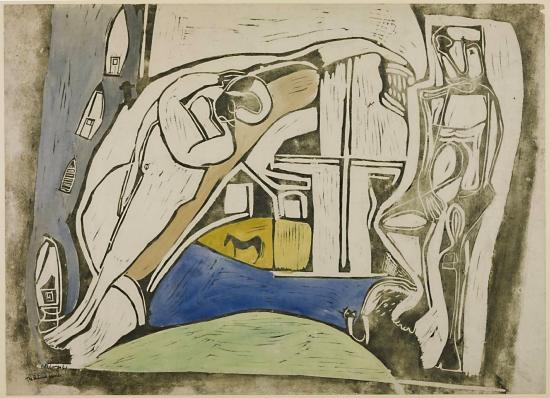
The Returned Seaman
1949
Peter Lanyon
b. Feb 8, 1918
_______________________
Two Prose Poems
Randall Horton
after ruin
Beauty after ruin lingers on the event horizon: infinity plus one, a new monin echoing yesterday’s cataclysm, a confluence of aestheticisms climaxing into a new way of looking—: (in). Ruin does this and perhaps is evermore tied to beauty. In the pursuit of beauty there is always already a series of invisible vertical bars, the indented metal shadows streaming across your face, reminders of how you border yourself off, reduced to a subjugated human in a cell. Epiphany: human cannot divide its[self] into fragments, it just is, but you can’t just “be,” so you become subject/object of your own ridicule....(more)
Spotlight: Prose Poetrytalking writing_______________________
Not Your Parents' Climate
A US study of more than 1,100 pages catalogues changes already occurring. We boil it down.
Chris Wood
The Tyee
The Tyee's Crash Course in Climate Change
all eight parts
_______________________

Union Square
c. 1910
(George Grantham Bain Collection, Library of Congress)via Tom Clark
_______________________
The Anti-Bullying Movement and Anti-Oedipal Psychology
Howard S. Schwartz
Social Science Research Network (SSRN)
Abstract:
Bullying appears to have become a matter of great public concern, but there does not appear to have been an increased of bullying in recent times. This suggests that what needs to be understood is the anti-bullying movement itself. This paper looks that the anti-bullying movement from a psychoanalytic point of view. It is built around a normalization of the "pristine self," which is a self untouched by anything but love. This idea of the self is a product of anti-oedipal psychology, based on the apotheosis of an omnipotent mother and the expulsion of the father. It undermines the transition from childhood to adulthood.
_______________________
Return of the oppressed
From the Roman Empire to our own Gilded Age, inequality moves in cycles. The future looks like a rough ride
Peter Turchin
aeon
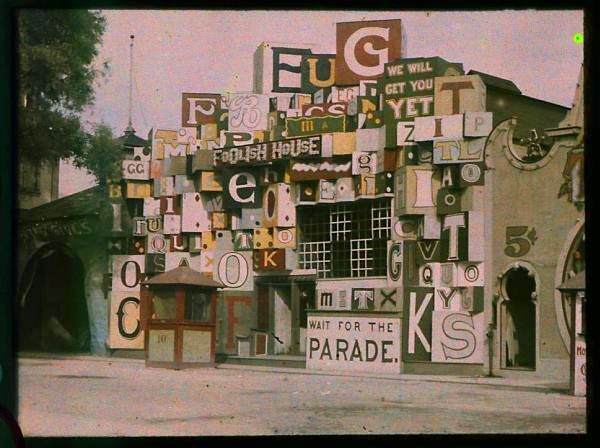
Foolish House
Ontario Beach Park
1910
Charles C. Zoller
George Eastman House's photostream
_______________________
Nature Talk
Flįvia Rocha
Translated by Idra Novey and Flįvia Rocha
“AND THE GARDEN SUDDENLY
ROCKED WITH A CRY OF CICADAS”
—Anna Akhmatova
In the garden, the click of cicadas:
this is our last existence:
as stream or weed
without the recollection of someone else’s
dream—
voices cross the air without the gift
of being heard.
“A GATHERED LAKE OF AQUAMARINE
BEGINS TO SMOKE”
—Elizabeth Bishop
Steaming, the lake is not at home:
we’re awake, but go on doubting.
Grey, blue, grey, blue. Listen—
insect wings flicker in the fog: the water
pours on to another place.
“SHARPER THAN EVER THE AIR
REMAINING: YOU MUST BREATHE”
—Paul Celan
The air comes sharp: we have to breathe.
Molds of plants everywhere:
almost plants, mute, fresh,
sneaking there—nearly a nest.
The ground raked
and nobody to find us.
...(more)
TWO LINES Online February 2013
Center for the Art of Translation
_______________________
The Progressive Puritan
Revisiting the Poems of Marianne Moore
Siobhan Phillips
boston review
Marianne Moore is always hiding in plain sight. She is the paradoxical radical, either distracting the reader from her traditionalism with avant-garde trappings or concealing rebellion in prim camouflage. She picketed for women’s rights and voted for Herbert Hoover. She distrusted the “obscenities” in William Carlos Williams and encouraged the “ability” in Allen Ginsberg. She breathed horror of “a sodomite” to one lesbian friend and signed letters to another “your affectionate albino-dactyl.” Those three-corned hats and men’s polo shirts: do they reflect an old-fashioned aversion to frippery or an innovative preference for androgyny? And her resolute urban celibacy (she lived in an apartment with her mother): a species of piety or a refusal of stereotypes? Moore’s mix of puritan and progressive seems quintessentially American—alert to the virtues of brown bread and the glories of Brancusi’s sculpture, to Pilgrim’s Progress as well as Ezra Pound. Likewise her get-to-the-point distrust of dreaming: “No wonder we hate poetry,” she writes in “Armor’s Undermining Modesty,” and “stars and harps and the new moon.” When Moore ends that poem on an “imperishable wish,” she means something as solid as the “hard yron” of another of her titles. Moore was indirectly forthright, demure and definitive at once.
...(more)
_______________________

The Artist
Moved by the Grandeur of Antique Fragments
John Henry Fuseli
_______________________
As language. . .Silence is also a language.
When there is no order in heaven
we make what we make
by luck, or strength,
or the composition of desire.
Power grows
like vegetation,
and there are no preferences under heaven.
I do not know why a leaf should be of less worth
than a Vatican,
or why builders care.
The mathematical stones recite their logic
of cruelty and despair
we arose to gratify some searchless reason
shaping the empty air.
Louis Dudek
b. Feb. 6, 1918
_______________________
impossible literature
Lars Iyer interviewed by Antōnio Xerxenesky
3am
(....)
Freud contrasted mourning with melancholy. You can ‘work through’ mourning, he allows, re-integrating the losses you have undergone into a new whole. Modernism mourned can be absorbed into whatever the period is in which we now live – Postmodernism, or post-Postmodernism. It can be studied, dissected, its authors profiled in the Sunday supplements. Its memory can be reactivated – why shouldn’t Modernist techniques inform the modern novel? Can’t contemporary literary fiction incorporate the lessons of the past?
But melancholy, according to Freud, continues indefinitely, and promises no new integration. And I am melancholy about our relationship with Modernism. Modernism is mute, in a certain sense. It doesn’t communicate with us. The link between past and present is broken. Literature survives today in literary fiction, which means literature no longer survives, or survives under erasure. The ‘realism’ of literary fiction is continuous with what Mark Fisher has called ‘capitalist realism’: the sense that our neoliberal present is the natural result of societal evolution, that it is eternal, that this is the only world there could be.
(....)
Writing on the impossibility of writing: it sounds very sterile and academic! It also sounds hackneyed: isn’t this what Blanchot wrote in the preface to Faux Pas? Isn’t it what Beckett said to Duthuit in their dialogues? But there is a crucial difference between writing on the impossibility of writing in the 1940s, and today. In a nutshell: the modernist experience of the impossibility of writing is still framed and validated as the impossibility of something worthwhile; but those times have passed, as I argue in my manifesto. Montano, in Vila-Matas’ novel, lives in an age which no longer accords literature its older prestige. There is something grotesque about the anachronism of Montano’s relationship to literature, which doesn’t mark that of Blanchot or Beckett. Montano’s problem is not the impossibility of writing, but the impossibility of experiencing the impossibility of writing. Montano only half-knows that he has come too late for literature. He nearly gets it. But for us, Vila-Matas’ readers, as well as for Vila-Matas himself, the situation is perfectly clear: Montano’s feeling of literary melancholy is laughable, even while we, too, share something of the experience.
...(more)
.....................................................
Nude In Your Hot Tub, Facing The Abyss
(A Literary Manifesto After The End Of Literature And Manifestos)
Lars Iyer
_______________________
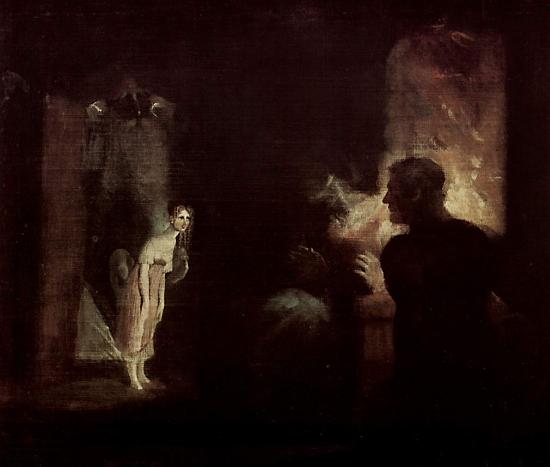
Undine Comes into the House of the Fishermen
John Henry Fuseli
b. Feb. 7, 1741
_______________________
The transparency delusion
Ivan Krastev
eurozine
(....)
Today, it is the person with the smartphone in one hand and the blank ballot in the other that symbolizes our democratic condition. Yet he or she is not a recognizable member of any particular class or ethnic group, and the ballot is no longer a weapon at his or her disposal. We don't think in terms of barricades, and we have vague ideas of who are "comrades" and who are enemies. Both the ballot and the smartphone are instruments of control, not instruments of choice. The actual fear of the smartphone voter is that the people he or she votes for will serve only their selfish interests. The citizen with the smartphone doesn't confront the tough ideological choices his predecessors faced. While the expansion of choices has radically increased in recent decades, in politics it has been the reverse. For the politically committed citizen of yesterday, changing one's party or political camp was as unthinkable as swapping one's religion. To move from the Left to the Right today, or the other way around, is as simple as traversing the border between France and Germany – it's a high-speed highway with no passport control.
So does the citizen with the smartphone represent the power we have accrued or the power we have lost? Should we be nostalgic for the decline of ideological politics or liberated by its burden? And can we trust the smartphone to be an effective new instrument to defend our rights?...(more)
_______________________
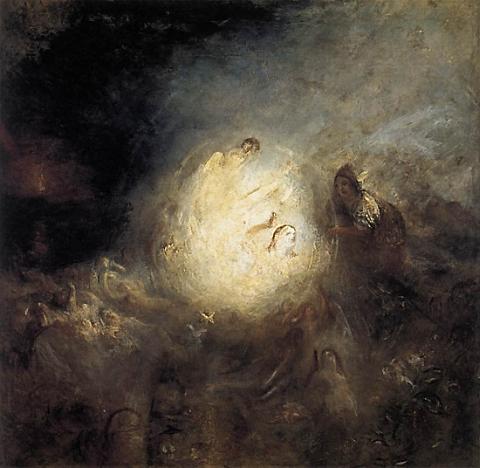
Undine
Giving the Ring to Massaniello
Fisherman of Naples
Joseph Mallord William Turner
_______________________
Metrics are not God nor do they give us life
Phil Cubeta
gifthub
(....)
Yet Blake also, wrote, "The cistern contains, the fountain overflows." And he said, "There is a moment in every day that Satan's watchfiends cannot find." By Satan he meant the god who constructs the clock in his image, and makes of the living earth a huge clock in which we must live, every second measured towards a benighted and sterile result. Yet, in every day, in every client or donor interview is that one moment that metrics cannot find. With a open question, we can open a crack in the ceiling of that clockwork office, and the light will or will not stream through. Either the angel enters or does not. We can only open that space for the time of one heartbeat, or with courage, three lungfulls of air, the rest comes from afar, or comes not at all. "The eye altering alters all." When the imagination opens its eye, the clockwork world becomes once again the organic world, the green world, where we cannot make it happen, we can only sow and hope to reap; only harrow, spade, and weed, so that what was seeded in us in our best moments comes up through the dirt, comes to fruition, and the seeds fall at last from us as we ripe, fall, and rot, so those seeds live on. As Blake lives on, and the force of the imagination that gives us life.
...(more)
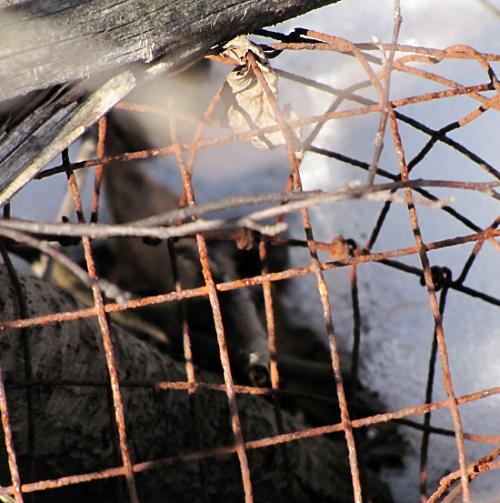
photo - mw
_______________________
The Wireless Code Working Document (Draft Code)
Canadian Radio-television and Telecommunications Commission
accepting comments until Feb. 15, 2013
_______________________
Triangulating utopia: Benjamin, Lefebvre, Tafuri [pdf]
Frank Cunningham
City, Volume 14, Issue 3 (June 2010)
Abstract
Assuming merit both in critiques of utopianism, such as those leveled by Jane Jacobs, and defences of utopian visions by David Harvey among others, this paper addresses what seems the dilemma that one must choose between visionary but unrealistic utopianism and stultifying submission to a status quo in the interests of realism and draws a solution from aspects of the views of Walter Benjamin, Henri Lefebvre and Manfredo Tafuri. Key dimensions of their approaches employed are, respectively, the 'dialectical structure of awakening', 'transduction' and the ideological dimension of utopianism. The paper concludes by indicating implications for urban theory and practice suggested by its putative escape from a realism/visionary dilemma.
via Online Papers in Philosophy _______________________
The Soul of Student Debt
Chris Maisano
jacobin
Not quite feudalism, student debt is a peculiarly capitalist form of social control.
Breaking the Chains of Debt Peonage
Chris Hedges The Politics of Debt in AmericaFrom Debtor's Prison to Debtor Nation.
Steve Fraser
Usurer Illusion
Erwin Montgomery reviews The Making of Indebted Man by Maurizio Lazzarato
Corporate Personhood and the Culture of Pathology
Nozomi Hayase
_______________________
The "Defunct Economist" And The Psychopathology Of Stephen Harper
Robin Mathews
Canada’s autopilot political culture
David Moscrop
_______________________
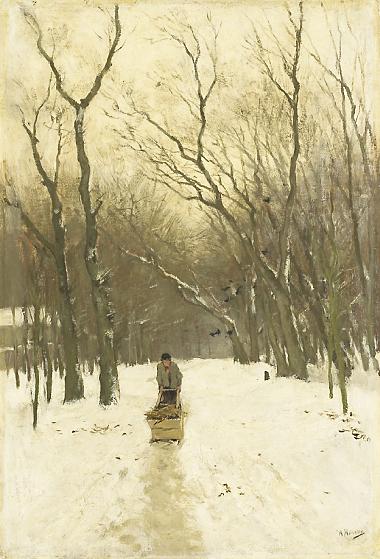
Anton Mauve
d. Feb. 5, 1888
_______________________
Speak, Memory
Oliver Sacks
(....)
It is startling to realize that some of our most cherished memories may never have happened—or may have happened to someone else. I suspect that many of my enthusiasms and impulses, which seem entirely my own, have arisen from others’ suggestions, which have powerfully influenced me, consciously or unconsciously, and then been forgotten. Similarly, while I often give lectures on similar topics, I can never remember, for better or worse, exactly what I said on previous occasions; nor can I bear to look through my earlier notes. Losing conscious memory of what I have said before, and having no text, I discover my themes afresh each time, and they often seem to me brand-new. This type of forgetting may be necessary for a creative or healthy cryptomnesia, one that allows old thoughts to be reassembled, retranscribed, recategorized, given new and fresh implications.
(....)
There is, it seems, no mechanism in the mind or the brain for ensuring the truth, or at least the veridical character, of our recollections. We have no direct access to historical truth, and what we feel or assert to be true (as Helen Keller was in a very good position to note) depends as much on our imagination as our senses. There is no way by which the events of the world can be directly transmitted or recorded in our brains; they are experienced and constructed in a highly subjective way, which is different in every individual to begin with, and differently reinterpreted or reexperienced whenever they are recollected. (The neuroscientist Gerald M. Edelman often speaks of perceiving as “creating,” and remembering as “recreating” or “recategorizing.”) Frequently, our only truth is narrative truth, the stories we tell each other, and ourselves—the stories we continually recategorize and refine. Such subjectivity is built into the very nature of memory, and follows from its basis and mechanisms in the human brain. The wonder is that aberrations of a gross sort are relatively rare, and that, for the most part, our memories are relatively solid and reliable.
...(more)
_______________________
Extremities of perception in an age of lenses.
Alan Wall
(....)
... We do not have separate compartments in our minds into which we can insert photographic images, as opposed to those we first encountered with the lenses of our own eyes.
(....)
Does this constitute a separation from reality as fissiparous as that which once came from reading romances, and then subsequently interpreting reality through them? Is this the lensed equivalent of mad old Don Quixote, intellectually ruined by his addiction to the romance narratives, or Madame Bovary, training herself for a life of emotional mendacity by mentally devouring the cheap fiction of her time?
We smile before lenses; we point them; we post the images around. We switch on Skype to see our nephew on the screen in New Zealand. We watch men dancing around in moondust, and we often view these images in the corner of our living rooms, more clearly than we see the neighbour outside mowing his lawn. Our memories have been converted into photographic museums, and we have never even asked who is responsible for the curation. How can we really distinguish between primary and secondary experience, between what is known and what imagined, even though that distinction still lies at the root of our notion of what segregates the psychotic from the functional (if melancholy) ordinary soul?
...(more)
fortnightly review_______________________
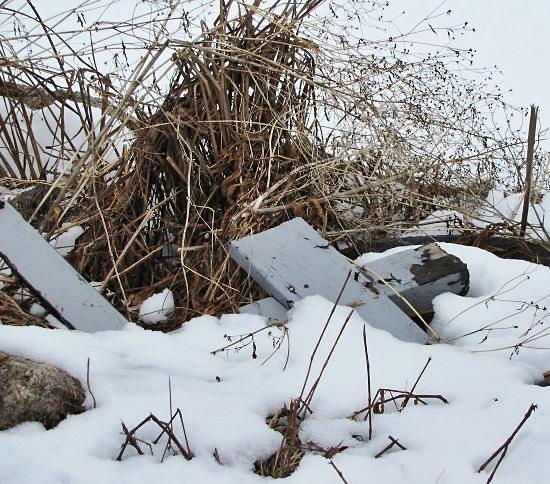
photo - mw
_______________________
Pathos: Lee Rourke
(....)
I feel that my writing, and the actual effort it takes to write, begins to distance itself from me, from the outset, from the very beginning: the act of writing is literally something foreign to me, it feels unnatural. I’m unable to locate it for a start. I’m not sure where it comes from, and I’m certainly not in charge of its outcome. The more I write the further away I feel from it. I never feel that I am the ‘master’ of my pen, yet I write regardless.
Maurice Blanchot puts it better when he says in ‘The Space of Literature’: ‘Every writer, every artist is acquainted with the moment at which he is cast out and apparently excluded by the work in progress.’
I guess this sense of exclusion, my lack of authority, is essential to my writing: it being the moment when I am actually closest to it. It’s a strange kind of paradoxical need; one in which fosters a certain kind of suffering: the realisation that my own writing’s point of origin can never be reached (like in all writing). This is fascinating to me, truly fascinating.
Blanchot goes on to say: ‘The writer seems to be the master of his pen; he can become capable of great mastery over words and over what he wants to make them express. But his mastery only succeeds in putting him, keeping him in contact with the fundamental passivity where the word, no longer anything but its appearance – the shadow of a word – never can be mastered or even grasped. It remains the ungraspable which is also unreleasable: the indecisive moment of fascination’.
...(more)
Full Stop
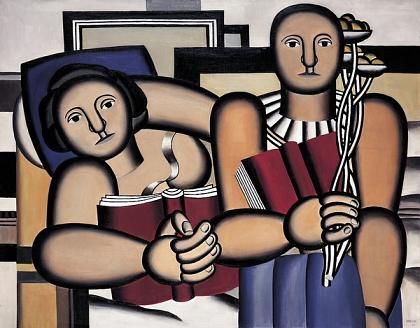
La Lecture
1924
Fernand Léger
b. February 4, 1881
_______________________
When Newspapers Were New, or, How Londoners Got Word of the Plague
Alexis Madrigal on Defoe's A Journal of the Plague Year
The Atlantic
(....)
On the very first page of his book, Defoe signals that information ecology will be a key subtext (emphasis added).
We had no such thing as printed newspapers in those days to spread rumours and reports of things, and to improve them by the invention of men, as I have lived to see practised since. But such things as these were gathered from the letters of merchants and others who corresponded abroad, and from them was handed about by word of mouth only; so that things did not spread instantly over the whole nation, as they do now.
There was something so contemporary about this observation, delivered through his narrator H.F. The arch language, the irony. The impossibility of narrowly distinguishing whether the author was for or against these newspapers. He was a creator of (the new) print journalism, and yet he does not know what to say about its impact on his world. I mean, who has not felt deep ambivalence about digital media while clicking away on Facebook or Twitter or Google News or TheAtlantic.com?
It could have stopped there. In fact, that was my plan for this post. Making fun of Vine, Ms. Vine User? Meet your ancestor, Daniel Defoe, patron saint of those who equivocate over their vocation.
But, this one phrase stuck in my head: "to spread rumours and reports of things, and to improve them by the invention of men." It is brilliant. Positive words (improve, invention) end up attached to "rumours and reports," and become deeply ambivalent. Improved rumors, invented reports, invented rumors, improved reports. (At least one of these things is not so bad.) The newspapers, then, pervert ... not the simple facts, but "rumours and reports of things," the stuff brought by merchants and letter-receivers, printed by pamphleteers, dreamed up in coffeeshops, posted in Bills of Mortality, given as decree by governments, divined in comet-visitations, or seen with one's own eyes. The newspapers, it would appear, perverted the melange that was late 17th-century news before the proliferation and formalization of newspapers. (A mix reflected in his Defoe's own publication, according to Defoe scholar Christopher Flynn.)
...(more)
_______________________
Three Poems
Eric Pankey
Conjunctions
Bone Fragments
Stray frays of virga. In the wood grain: line graph of annual rainfall.
Thunder, we know, lags back at the speed of sound: the past catches up.
Along the road: barbed wire, telephone poles, vectors and alignments,
A wide array of radio telescopes motionless on rails.
The road—paved, gravel, then dirt—snakes back on itself to move ahead.
Sedimentation buries; erosion exhumes. Mark the changes.
What have we come to see: a practical field? A modest shrine?
How can one behold and not add to or subtract from the beheld?
Outside Quemado: the ephemeral phenomena of light.
To make art one must make a mark, preserve or disturb the silence.
To define a space, the space beyond it must be surveyed as well.
Imagine a field ringed by, surrounded by, enclosed by mountains.
The subject is not the edge, but the maze inherent within a grid.
No contrails. Today, I’ve counted nine antelope, eighteen lizards,
Six hares, four jackrabbits, and a falcon perched on a lightning rod.
We talk at the table as the sun goes down, talk on in darkness—
No doubt there are some kinds of knowledge that appear immutable.
This leads some people to think that the stability of contents
Is due to the stability of the container, that the forms
Of rationality are permanent … We talked at the table
As last light flashed, flared, and was extinguished. What was not light seeped in.
Ten thousand stars stand out from the milky smear of the galaxy.
I woke late, found bone fragments you’d collected and left on the porch.
I puzzle the pieces: a coyote’s ball and socket joint,
Or perhaps a gray fox’s or a dog’s? The cracked femur spills sand.
...(more)
Eric Pankey at the Academy of American Poets
_______________________
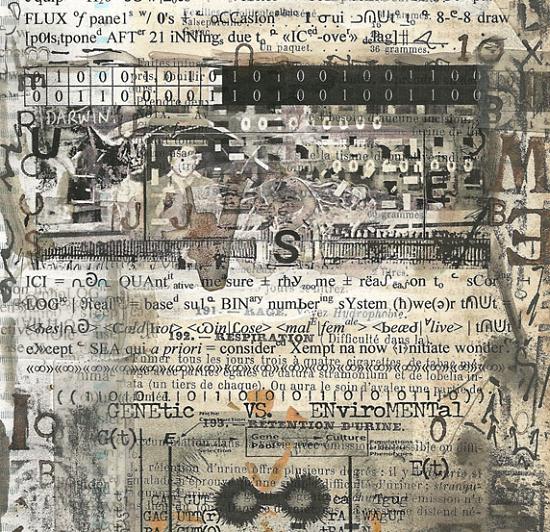
from 4 ARK CODEX ±0
detail
by Ark Codex
Action Yes
_______________________
Five Poems
Simon Perchik
*
Even with a fence the darkness
never heals, comes and goes
the way each star circles this gate
reclaims the Earth with a chain
half one by one, half
where all the dead clasp hands
and still this wound won’t close
though you cover her cheeks
with dirt that must be carried
smells from rain and loneliness
before burning to the ground
and all these stars arm in arm
clinging to the same small stone
light-years away, crumbling
as if these scattered graves
closer and closer will suddenly return
made whole as the first sunrise
then leave without her or you. *
...(more)
Otoliths
Issue twenty-eight, February 1, 2013.
_______________________
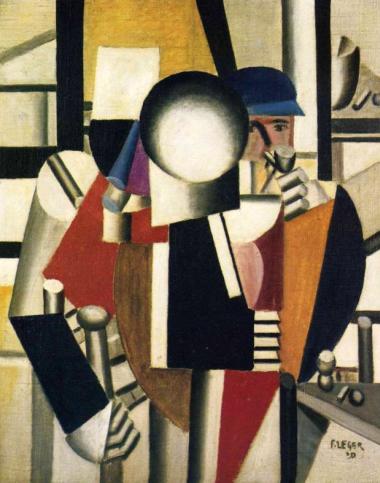
The Three Comrades
Fernand Léger
1920
_______________________
The Next Left
An Interview with Bhaskar Sunkara
boston review
... we are reclaiming freedom for the left. There is something in the vision of socialism that isn’t just rooted in the kitschy Soviet producerism. To some extent socialism could ideally be the ultimate ownership society. A radical extension of democracy and control into the social and economic realms, a society without the exploitation of person by person—it’s a realm of individual empowerment.
Take this recent debate: technological improvements could create mass unemployment or lead to shorter working hours. But changes in the mode of production do not necessarily mean improvement or emancipation unless there is a political will to change the way the fruits of this productivity are distributed. This is a pretty basic point. That’s why people would benefit from reading Marx. But if you don’t have it in your political repertoire, you end up as someone like Drum who has a profoundly stunted political imagination. Drum and all these people are running into the distant limits of their brand of analysis, and it’s clear even to them that Jacobin has ideas for the future—even if some of these aren’t too novel and are just updates on traditional left-wing ideas that meet the material needs of our moment.
...(more)
_______________________
Everyman's Marx
(2010)
Roger Gathman
_______________________
JeDEM - eJournal of eDemocracy and Open Government
Vol 4, No 2
The invited papers represent extended papers by Axel Bruns and Caroline Haythornthwaite, keynotes at the CeDEM. Their keynotes and their papers look at the important issues that need to be considered for openness in e-government and e-democracy to be successfully implemented and used. Axel Bruns’ paper focuses on the development, interaction and self-organisation of online citizen communities. By analyzing the use of social media during acute events (the floods in Australia and the case of Wikileaks), he suggests taking the lessons learned here and applying them to e-democracy initiatives. Such lessons may be ensuring low hurdles to participation, keeping things simple, and allowing access through more than just one point of entry. Caroline Haytnornthwaite looks at what supports participation in online networks, peer production and collective action. First, a distinction between online communities and online crowds must be made, as they represent two very different forms of online organization. Secondly there are a range of factors such as reputation, recognition, and reward systems that impact how people participate, control and contribute information and thus in turn impact e-participation, voting, information sharing and democratic processes. _______________________
Mind readers
David P Barash
aeon
Consciousness was for a long time the charged third rail of biology: touch it and … well, maybe you didn’t die, but you were unlikely to get a grant, or tenure. Of course, it helped if you were a Nobel laureate, such as Francis Crick, lauded for his work on DNA, or Gerald Edelman, for his work on antibodies. Yet even their attempts to pin down the electrical-chemical-anatomical (or whatever) substrate of consciousness seemed, until recently, likely to go the way of Albert Einstein’s doomed search for a unified theory of everything. However, the situation has changed dramatically in recent years. Inquiry into the neurobiology of consciousness has become one of the hottest, best-funded, and most media-friendly of research enterprises, along with genomics, stem cells and a few other newly favoured sub-disciplines.
For centuries, it was perfectly acceptable for philosophers to ponder consciousness because, after all, no one actually expected them to come up with anything real. Thus, René Descartes’s renowned statement ‘Cogito ergo sum’ (I think therefore I am) becomes, in the words of the early 20th-century American satirist Ambrose Bierce, Cogito cogito ergo cogito sum — I think that I think, therefore I think that I am (which was, according to Bierce, about as close to truth as philosophy was likely to get). Now we have micro-electrodes recording from individual neurons, computer modelling of neural nets, functional MRIs, and an array of even newer 21st-century techniques, all hot on the trail of how consciousness emerges from ‘mere’ matter. Cartesian dualism is on the run, as well it should be.
Admittedly, there are some exceptions to this scientific turn of events, proving that imbecility runs deep in humans, especially in the curious world of the consciousness-credulous. ...(more)
_______________________
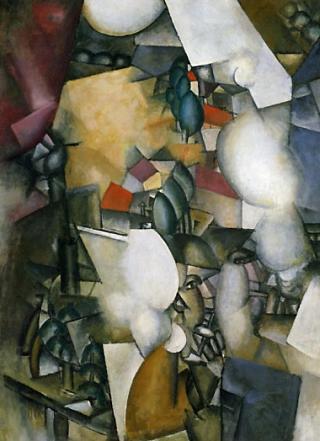
Smokers
Fernand Léger
1911
_______________________
Journal Of Surrealism And The Americas
Issue 6:1 (2012)
Notes for a Historiography of Surrealism in America, or the Reinterpretation of the Repressed
Samantha Kavky
'What Makes Indians Laugh': Surrealism, Ritual and Return in Steven Yazzie and Joseph Beuys
Claudia Mesch
Abstract
This paper traces the shift into performative interactions by European scholars and artists as they sought or feigned interaction with the spirits and objects of Native American culture. I discuss the postwar artworks of Max Ernst, Joseph Beuys, and Steven Yazzie. I argue that each of these artists’ use of Native American objects goes beyond earlier surrealist appropriative and mimetic strategies. From a postcolonial position, these artworks address personal trauma as well as the collective trauma of colonialism. Aby Warburg’s late nineteenth-century travel to the American Southwest, and his resulting notion of an aesthetics of empathy, or of “mimesis through communion with/entering into the object,” becomes very relevant for Beuys’ work in particular. Furthermore these postwar artworks by Ernst, Beuys and Yazzie contain a comic element that invites laughter, a critical/therapeutic element that Pierre Clastres describes as a distinctly political act.

photo - mw
_______________________
February
Margaret Atwood
(....)
But it’s love that does us in. Over and over
again, He shoots, he scores! and famine
crouches in the bedsheets, ambushing the pulsing
eiderdown, and the windchill factor hits
thirty below, and pollution pours
out of our chimneys to keep us warm.
February, month of despair,
with a skewered heart in the centre.
...(more)
thanks to A la recherche du temps perdu
_______________________
One warm line
The life well-lived, the path well-walked, each full of loops and weavings, until a person maps their patch of earth
Nat Case
aeon
(....)
The Canadian songwriter Stan Rogers sang of ‘One warm line, through a land so wild and savage’, and if you’re pondering your life as a single story, winding through the landscape, that image does make a lot of sense.
But the world itself is not linear. Life stretches out around us, unrelievedly three-dimensional, and our pathways through it are neither straight nor simple. Robert Frost’s two paths were not his only choices. He could have ducked off the path altogether, ignoring the ‘No Trespassing’ signs in the Vermont woods. What is more, the line of our life is full of little loops — from home to work and back, upstairs and downstairs again, tossing back and forth in our beds. We fairly hum with movements that don’t go anywhere except back to where we just were.
If so, how do we do that, while knowing that there is no forward inherent in the world except for the direction we happen to be facing? How do we inhabit this intractably complex, three-dimensional world, even as we trace the line of our lives across its two-dimensional surfaces?
...(more)
_______________________

narrows lock
photo - mw

photo - mw
_______________________
Crčme de la crčme
Kristina Carlson
Translated by Hildi Hawkins
books from finland
Such straining and pasteurising is going on in the city that Arabs and other Muslims, the unemployed, drunkards, poor people and lunatics have been eliminated. By chance I became a cultural figure, and I was invited to a cultural evening whose invitation had been personally written by the Anarchist. At the restaurant table sat the Anarchist, the Psychoanalyst and the Psychologist’s boyfriend, 20 years younger, the Journalist, the Gift-Shop Owner, a Librarian and the Deputy Rector of a community college. Accompanying me to the restaurant, too, were the Wolf and the Deer, who hadn’t been invited. ...(more)
_______________________
Nathaniel Tarn On Poetic Production, "The Embattled Lyric"
and a Topography of Hope
alligatorzine
(....)
At this point, despite the claims on me of isness, ipseity, immanence; despite the cardinal directive of virtually all secular or profane philosophies – i.e. “lead your life in the moment and nowhere and at no time else,” I continue to find the questions “why? what for?” fundamentally overwhelming. Entertainment left completely behind, the point of producing Hope in the form of poetry seems to withdraw into immeasurable distance and alienation. In plainer words, how and why does a thinking human being continue the activity of hoping when in the absence of all apparent ground for Hope? When, as a poet, one has lived longer in death than in life? When to be a poet as fully as to be a human being is to be in a great many ways already dead? A little later, I’ll be going into the figure of Orpheus as the archetypal poet-visitor from the dead.
(....)
... since all Process is fated to end back in Structure before going on to the next Process, the Idyll, like Janus, is double faced. I have often felt that this is close to the depiction of epilepsy as most dramatically described by, say, Dostoevsky – where a feeling that the epileptic owns the world and all knowledge crashes into the erasure of the epileptic fit proper. For it is precisely at the point where the Idyll peaks in what one could call, somewhat ironically today, a, or the Rapture – where the poet feels the poem cannot finish, that the poem is ready to descend into its final phase and take its place in the Opus which now will own one more poem.
ASIDE/{N1}: I wish it were possible to discuss this in connection with Giorgio Agamben’s conclusions in his “The End of the Poem” essay in the book of the same name (Stanford, 1999) or Walter Benjamin’s statement to the effect that “every completed work is the death-mask of its intuition” but we would need a seminar. The major equation in such an event would be the end of a poem as the poet’s death - in - life.
...(more)
_______________________
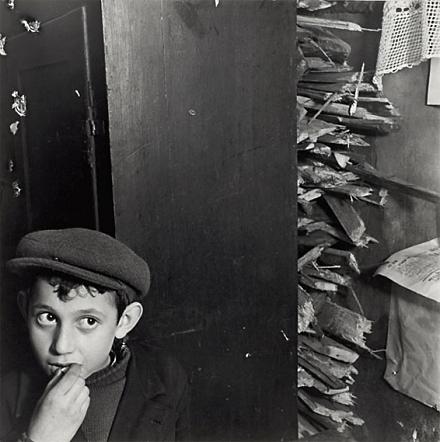
Roman Vishniac
Rediscovered at the ICP
via
_______________________
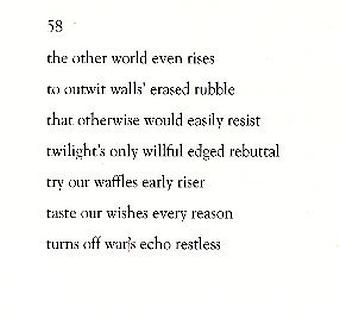
Charles Alexander, Near or Random Acts
[sections 56-66]
A space only you can build (PoemTalk #62)
Charles Alexander, "Near or Random Acts"
Six Sonnets by Charles Alexander
from Prayer, Rupture, Dwelling
Carlles Alexander & Sheila Murphy
. . . a collaboration
jacket 4
Charles Alexander is founder and director of Chax Press .....................................................
Echoes listening hearing
Transmission
Charles Alexander
jacket 2
I’m reading about hearing loss, and creative use of hearing and listening, in essays in Beauty is a Verb, ed. by Jennifer Bartlett, Sheila Black, and Michael Northen (a must-read book!). Thinking about how all hearing is probably mis-hearing, and all movement from one source to another (poem in head to poem on page, poem from poet to poem in book by publisher, poem read in book to poem in reader's head, poem uttered in reading to poem heard in reading) involves evolution, change. Laurie Clements Lambeth, in her essay “Reshaping the Outline,” in this book, speaks of this with grace and clarity, including the creative potential of such transmission, or, if you like, mistransmission.
I find myself reading Norma Cole's essay in the book, “Why I am Not a Translator II,” and echoing its words as I go, according to thoughts I'm developing about the book's (in a large sense) openness and impermanance, maybe the idea's openness and impermanence. From this point, until and not including the last line, I have taken excerpts from Norma Cole's writing, including that essay, and the following poem, also included in Beauty is a Verb, titled “Speech Production Themes and Variations,” and those excerpts appear first, not in parentheses, with my echoing of them following in parentheses.
Word-seeds. Sphota. ( ideas seeds flax paper book )
one has ideas before one has words to say them. . . . No tabula rasa. ( the book is always pre-content )
Ideas that pre-exist words and objects. ( Book is word-object / book is spoken / book is convention, convened, convection, convict, closed case, open mind )
...(more)
_______________________
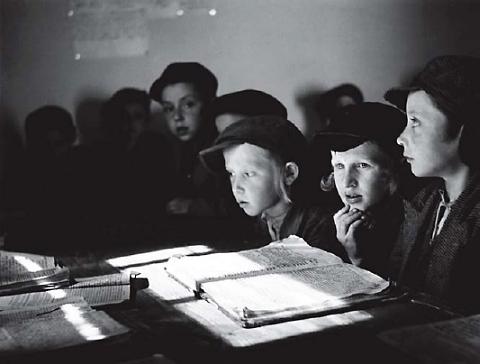
Roman Vishniac
1897 - 1990
_______________________
The World as Metaphor in Musil’s The Man Without Qualities
David Auerbach
waggish
(....)
Abstraction remains present to a far greater degree in particularities than we realize. It is obscured by the sheer reinforcement of the metaphorical structures that come to seem purely representative. Seemingly “abstract” thinking can be more liberating than the desiccated imagery of poetry precisely because it is not more abstract, but only more free:
In our poems there is too much rigid reason; the words are burned-out notions, the syntax holds out sticks and ropes as if for the blind, the meaning never gets off the ground everyone has trampled; the awakened soul cannot walk in such iron garments. (1564)
Leaving the precise, measurable, and definable sensory data out of account; all the other concepts on which we base our lives are no more than congealed metaphors [erstarren gelassene Gleichnisse]. (626)
Here Musil unites an attack on the surface beauty of most poetry with his brilliant, earlier critique of empiricism, suggesting that they both come out of an adherence to an underlying conceptual structure that is taken for granted (selbstverständlich):
The relationship between youth and empiricism seemed to him profoundly natural, and youth’s inclination to want to experience everything itself, and to expect the most surprising discoveries, moved him to see this as the philosophy appropriate to youth. But from the assertion that awaiting the rising of the sun in the east every day merely has the security of a habit, it is only a step to asserting that all human knowledge is felt only subjectively and at a particular time, or is indeed the presumption of a class or race, all of which has gradually become evident in European intellectual history. Apparently one should also add that approximately since the days of our great-grandfather’s, a new kind of individuality has made its appearance: this is the type of the empirical man or empiricist, of the person of experience who has become such a familiar open question, the person who knows how to make from a hundred of his own experiences a thousand new ones, which, however, always remain within the same circle of experience, and who has by this means created the gigantic, profitable-in-appearance monotony of the technical age. Empiricism as a philosophy might be taken as the philosophical children’s disease of this type of person. (1351) ...(more)
_______________________

photo - mw
_______________________
Book review: Thieves of Bay Street
Countering the claim that Canada's finance industry is stable and well regulated
Al Engler on Bruce Livesey, Thieves of Bay Street: How Banks, Brokerages and the Wealthy Steal Billions from Canadians
_______________________
The “Defunct Economist” And The Psychopathology Of Stephen Harper
Robin Mathews
_______________________
International Graphic Novels: Volume VII
Words without Borders
February 2013
|




































